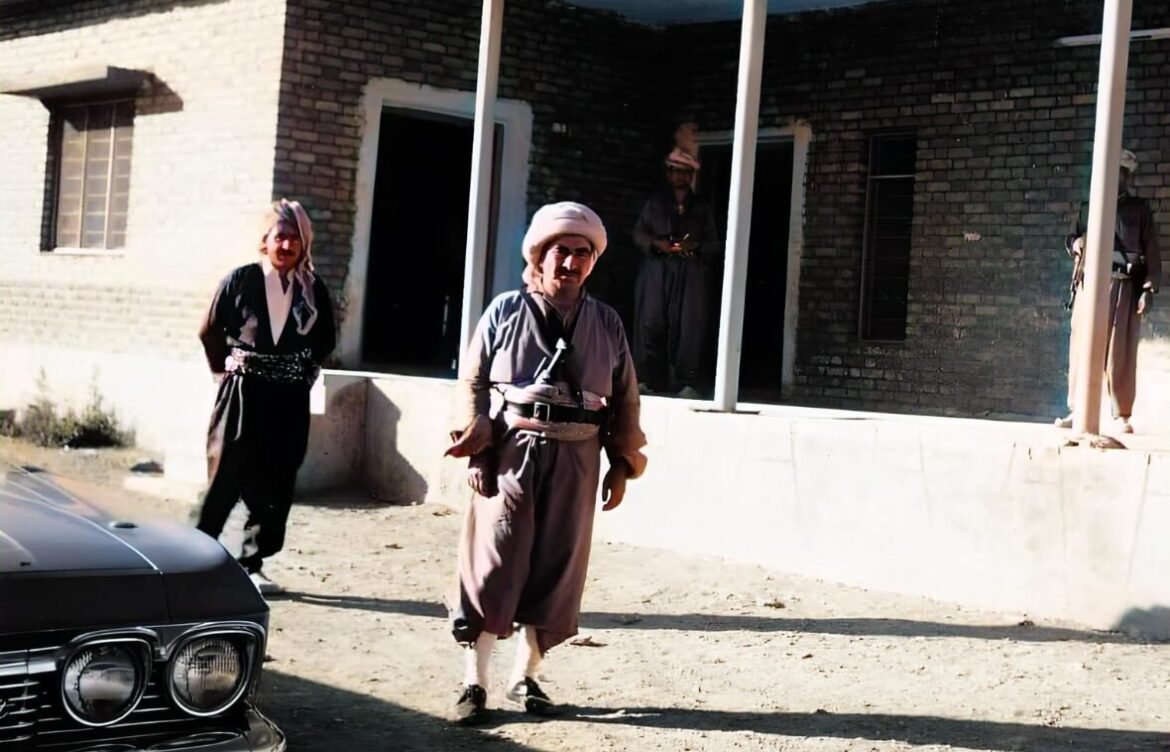
Comprehensive Biography of Faris Hamad Bawa
Name: Faris Hamad Bawa (also known as Fars Bawa)
Birth: Spring 1932, Village of Malaqara, Kandena Plain, Kurdistan
Death: March 21, 1995, Pirmam, Erbil Province
Burial: Pirdawd Village, Erbil Province
Languages: Kurdish, Arabic, Persian
Spouse(s): Haji Fatim, Ms. Suad
Children: Naif, Bawar, Hogar, Tawana, Karim (sons), and three daughters
Early Life
Faris Hamad Bawa was born in the spring of 1932 in the village of Malaqara, located in the fertile plains of Kandena near Erbil, Kurdistan. His birth coincided with the waning days of the Barzan revolutions, a period marked by intense struggle and hope for Kurdish independence. Growing up in an environment steeped in revolutionary fervor, Faris was inspired by the bravery and sacrifices of his compatriots, shaping his resolve to fight for Kurdish liberation.
Path to Revolution
In the early 1950s, Faris chose the path of sacrifice and joined the Kurdish revolutionary movement. His commitment was unwavering, and he vowed to fight for Kurdistan’s freedom until the goal was achieved. In 1956, his revolutionary activities led to his arrest and imprisonment in Kirkuk prison, where he was held alongside notable Kurdish figures such as the great poet Abdullah Goran and Abdullah Ismail Ahmad, known as Mullah Motor. He was released following the coup d’état of July 14, 1958, which brought significant political changes in Iraq.
Joining the Kurdistan Democratic Party (KDP)
In 1958, Faris joined the Kurdistan Democratic Party (KDP), an organization central to the Kurdish struggle. By 1963, he had become a member of the Peshmerga, the armed forces of the Kurdish resistance. That same year, he took part in the Battle of Darkhurma and the Battle of Qashqa in Erbil province, fighting against the National Guard. His bravery and leadership skills were evident, earning him the role of a Peshmerga commander at the Koya Congress (First People) in the border town of Koya, Erbil province.
Military Leadership and Achievements
Faris Bawa’s military career is distinguished by numerous significant battles and strategic victories:
- 1963: Participated in the Battle of Spilk under the command of Colonel Kafi Nabawi against the Iraqi army. He served in the 1st Battalion of the Erbil Plain within the Safin Force.
- 1965: As the commander of the 1st Battalion of the Erbil Plain, he led his forces to victory in the Battle of Mount Safini.
- 1968: Appointed commander of the Erbil Plain Force, he launched attacks on Iraqi army bases and internal factions, including the Ibrahim Ahmad-Jalal Talabani group. He played a crucial role in Operation Babagurgur, targeting the Kirkuk Oil Company.
In 1969, he successfully defended the headquarters of the Erbil Plain Force from attacks by the Iraqi army and the Ibrahim Ahmad-Jalal Talabani group, showcasing his tactical acumen and leadership. He became a member of the KDP Central Committee, further solidifying his influence within the party.
Political Contributions
Faris Bawa’s contributions were not limited to the battlefield; he was also a skilled political leader. In 1970, he was appointed head of the second branch of the KDP and was promoted to temporary police lieutenant by the Chairman of the Iraqi Revolutionary Council in December 1971. His political activities focused on raising awareness among the Kurdish people and fostering a strong sense of national identity and pride.
Battles and Leadership in the 1970s
The 1970s were marked by intense military engagements for Faris Bawa:
- 1971: Commanded the 11th Battalion of the Border Guard.
- 1972: Hosted a delegation from the United Socialist Party of Germany led by Paul Ferner, accompanied by President Mustafa Barzani, discussing Kurdish issues at the Peace Palace near Choman, Erbil province.
- 1974: Led the Battle of Giray Rash and was a commander in the Battle of Makok, where Peshmerga forces defeated the Iraqi army.
Faris lived in exile in Iran for several years due to the political climate in Iraq. He returned to Kurdistan following a pardon by the Iraqi Revolutionary Leadership Council on December 19, 1978.
Return to Kurdistan and Later Years
In 1991, Faris Bawa participated in the Kurdistan Uprising, contributing to the region’s fight for autonomy. After the uprising, he became the commander of the Erbil Defense Forces and later served as the administrator of the second branch of the KDP and head of the military department.
As his health deteriorated, Faris Bawa returned to Pirmam. On March 13, 1995, he was visited by Masoud Barzani, who assured him that his efforts and sacrifices would be honored by future generations. Barzani’s words, “You are Barzani’s son,” bestowed upon Faris a great honor, acknowledging his enduring impact on the Kurdish struggle.
Death and Legacy
Faris Bawa passed away on March 21, 1995, while the Kurdish people celebrated Newroz, symbolizing both a time of rebirth and a poignant moment of loss. His death was widely mourned, and his contributions to the Kurdish cause were deeply remembered. Initially buried in Salahaddin resort, his remains were transferred to Pirdawd village on March 10, 1997, in a ceremony attended by party and administrative officials.
Faris Bawa’s legacy is marked by his heroic participation in the September Revolution and his long-term leadership of the Erbil Plain Force. His family continued his legacy of sacrifice, with his siblings and other relatives contributing significantly to the Kurdish struggle.
Faris Bawa’s life, filled with bravery, dedication, and unyielding commitment to the Kurdish cause, remains a source of inspiration for future generations. His story is a testament to the resilience and spirit of the Kurdish people in their quest for freedom and self-determination.
Conclusion
Faris Hamad Bawa’s life and legacy reflect the enduring struggle and sacrifice of the Kurdish people. His contributions to both military and political spheres have left an indelible mark on the history of Kurdistan. Remembering his heroism and dedication helps keep the spirit of the Kurdish revolution alive and honors the sacrifices made by countless individuals for the cause of Kurdish independence.
